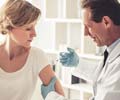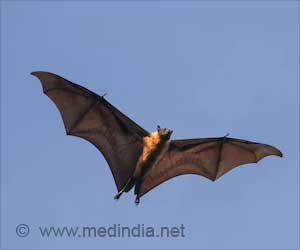Researches say that in West Africa, health care disruptions cause by Ebola crisis has reduced vaccinations, increasing probability of measles and other vaccine preventable illness.

"The secondary effects of Ebola — both in childhood infections and other health outcomes — are potentially as devastating in terms of loss of life as the disease itself," says study leader Justin Lessler, PhD, an assistant professor in the Department of Epidemiology at the Johns Hopkins Bloomberg School of Public Health. "While the downstream effects of Ebola are many, we can actually do something about measles relatively cheaply and easily, saving many lives by restarting derailed vaccination campaigns."
The current Ebola outbreak began in December 2013 in Guinea and since then there have been more than 14,200 confirmed cases in Guinea, Liberia and Sierra Leone, with more than 9,500 deaths blamed on the disease in those nations. Many health-care facilities in the region have been closed; many citizens have stayed away from those that are open for fear of contracting the deadly disease. As a result, many have not received routine medical care.
Measles epidemics often follow humanitarian crises, Lessler says. Measles, one of the most transmissible infections, tends to have lower vaccination rates in many developing countries, partly because the vaccine is given around nine months of age, when parents may no longer have regular contact with health care providers. But over the past decade, successful vaccine campaigns have led to dramatic drops in the number of measles cases in the region.
For their new research, Lessler and his colleagues used data-driven models of the region to estimate potential measles outbreak risk, attack rates and mortality rates resulting from a 75-percent disruption in health care services in West Africa stemming from the Ebola outbreak. They also looked at 25, 50 and 100 percent reductions, but 75 percent was most in line with reports available at the time. (Recent reports suggest smaller, but still severe, disruptions). Their 18-month forecasts are based on geospatial mapping as well as the projection of age-related patterns of susceptibility to the measles.
The researchers estimated that prior to this Ebola outbreak there were about 778,000 children between nine months and five years old in the three nations who had not been vaccinated against measles, equating to roughly 4 percent of the population. After 18 months of Ebola-related disruptions to the health-care system, the researchers estimate, there will be up to 1,129,000 unvaccinated children between the ages of nine months and five years, a 45 percent increase.
Advertisement
While Lessler and his colleagues only looked at the potential for a measles outbreak, he says the Ebola epidemic has also slowed delivery of the oral polio vaccine, a tuberculosis vaccine and the pentavalent vaccine, which protects against Haemophilus influenzae type b (the bacteria that causes meningitis, pneumonia and otitis), whooping cough (or pertussis), tetanus, hepatitis B and diphtheria. He estimates that the number of children not receiving these vaccines in the region may be 600,000 to 700,000. The provision of health care to people with malaria, HIV and tuberculosis has also been disrupted.
Advertisement
Lessler says he hopes that with a better understanding of the scope of the measles susceptibility problem, governments and non-governmental organizations will be able to focus their resources on restarting vaccination programs in order to mitigate the side effects of the Ebola crisis.
Source-Medindia











